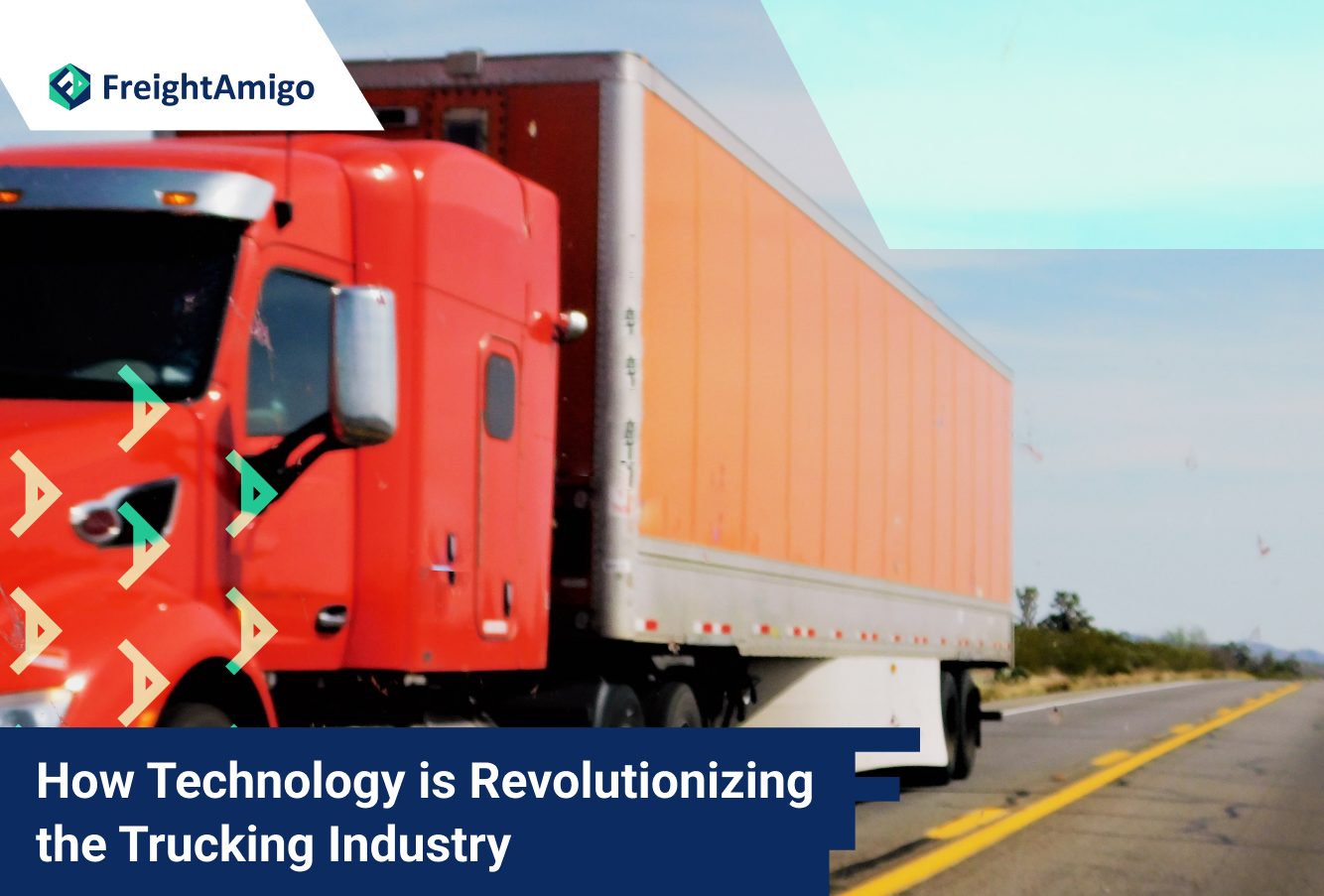Author Name: Aurora Park – Marketing Analyst at FreightAmigo
The trucking industry has been undergoing a significant transformation due to the rapid advancement of technology. From the implementation of safety features to the emergence of autonomous trucks, technology is reshaping the way goods are transported and creating new job opportunities for skilled professionals. In this article, we will explore the main technologies that are revolutionizing the trucking industry and what they mean for the future.
Want to compare the best Express, Air Freight, Sea Freight, Rail Freight & Trucking rates so as to have better control on cost?
Safety-Inspired Blind Spot Mirrors: Enhancing Visibility and Safety
One of the main technologies used in the trucking industry is safety-inspired blind spot mirrors. These innovative devices are designed to provide drivers with a clear view of areas around their vehicle that are usually hidden from sight. By eliminating blind spots, these mirrors enhance visibility and help prevent accidents caused by lane changes or merging.
Truck dash cams are also becoming increasingly common in the industry. These cameras capture valuable footage that can be used to investigate accidents and other incidents. They provide concrete evidence and valuable insights into driver behavior, helping companies improve safety measures and reduce risks.
Fleet Management Systems: Streamlining Operations and Improving Efficiency
Fleet management systems play a crucial role in helping trucking companies manage their fleets more efficiently. These systems track and monitor various aspects of fleet operations, such as vehicle location, driver performance, fuel usage, and maintenance schedules. By providing real-time data and analytics, fleet management systems enable companies to make informed decisions and optimize their resources.
There are several types of fleet management systems available, including GPS tracking, driver performance monitoring, and maintenance scheduling. GPS tracking allows companies to monitor the real-time location of their vehicles, ensuring timely deliveries and efficient route planning. Driver performance monitoring helps identify areas for improvement and promotes safe driving practices. Maintenance scheduling ensures that vehicles are regularly serviced and minimizes the risk of breakdowns.
By utilizing fleet management systems, trucking companies can operate more efficiently, reduce costs, and enhance safety. These systems help minimize idle time, leading to significant fuel savings and other operational expenses. Monitoring driver behavior and vehicle performance also reduces the risk of accidents and other safety issues.
Electronic Logging Devices (ELDs): Ensuring Compliance and Enhancing Safety
Electronic logging devices (ELDs) are another technology transforming the trucking industry. These devices are installed in trucks to record a driver’s hours of service and ensure compliance with federal regulations. ELDs automatically track driving time, rest breaks, and other vital data points, sending this information to a centralized database.
ELDs streamline the process of tracking driver hours of service, saving time and reducing paperwork for trucking companies. They also play a crucial role in improving safety by ensuring that drivers take necessary breaks and rest periods to prevent fatigue-related accidents. Additionally, ELDs level the playing field for all companies, as they enforce the same standards and prevent rule-skirting practices.
Dynamic Routing: Optimizing Routes for Efficiency and Cost Reduction
Dynamic routing is a data-driven process that determines the best routes for a fleet of vehicles. By considering factors such as weight, cost, distance, time, customer preferences, and safety, dynamic routing systems can quickly calculate the most efficient path for drivers. This technology saves time, reduces fuel costs, and enhances operational efficiency.
Dynamic routing allows high-traffic volume networks to adapt and reroute traffic along the most efficient paths. Even in the face of unexpected road closures or disruptions, the system can recalculate the best route, expediting deliveries. Real-time updates on changing traffic patterns and other factors help drivers make informed decisions and avoid delays.
The adoption of dynamic routing technology makes the trucking industry more efficient, cost-effective, and customer-focused. Companies can optimize their routes, minimize fuel consumption, and reduce travel time, resulting in significant cost savings. Moreover, customers benefit from faster and more reliable deliveries.
Mobile Apps: Real-Time Access to Critical Information
Mobile apps have become increasingly popular in the trucking industry, transforming how companies do business. These apps provide drivers with real-time access to important information, improving efficiency and reducing errors that may arise from the lack of readily available data.
Trucking companies can use mobile apps to provide drivers with schedules, routes, and updates on delivery times. This enables drivers to stay informed and make better decisions during their journeys. In-app messaging and real-time GPS tracking facilitate effective communication between drivers and dispatchers, ensuring smooth operations and timely responses to any arising issues.
Mobile apps also contribute to safety improvements in the trucking industry. Some apps offer real-time updates on road conditions and weather patterns, helping drivers make informed decisions about their routes and driving conditions. Features like fatigue monitoring and coaching help drivers stay alert and focused, reducing the risk of accidents.
Autonomous Trucks: Shaping the Future of Trucking
Autonomous trucks, also known as self-driving trucks, are a significant development in the trucking industry. Equipped with advanced sensors, cameras, and other technologies, these vehicles can navigate roads and highways without human intervention. Although fully autonomous trucks are not yet common, they are being tested and deployed in certain areas.
The potential benefits of autonomous trucks are numerous. They can significantly reduce labor costs for trucking companies, as they eliminate the need for human drivers. Autonomous trucks can operate 24/7 without rest breaks or shift changes, improving efficiency and optimizing routes for fuel consumption and travel time.
However, the deployment of autonomous trucks for interstate travel still requires clearance from the federal government. Currently, several states allow intrastate deployment and testing with human backups on board. Despite the challenges, autonomous trucks hold the promise of revolutionizing the trucking industry and shaping its future.
Conclusion
In conclusion, technology is revolutionizing the trucking industry in multiple ways. Safety-inspired blind spot mirrors and truck dash cams enhance visibility and provide valuable footage for accident investigations. Fleet management systems streamline operations, reduce costs, and improve safety. Electronic logging devices ensure compliance with hours of service regulations and promote driver well-being. Dynamic routing optimizes routes for efficiency and cost reduction. Mobile apps provide real-time access to critical information and enhance communication. Lastly, autonomous trucks have the potential to reshape the industry by reducing labor costs and improving efficiency.
As technology continues to evolve, the trucking industry will undoubtedly experience further transformations. While challenges and regulatory considerations remain, the integration of technology promises a future that is more efficient, safer, and customer focused. Embracing these technological advancements will be crucial for companies operating in the trucking industry to stay competitive and thrive in the evolving landscape.
There are different options for cargo transportation. If you want to choose the most convenient and suitable solution, it is best to have the full support of logistics experts! If you are planning to ship goods overseas, please go to the FreightAmigo page for inquiries.
===
Read More:
Self-driving Trucking | Cybersecurity and Data Protection
===
If you have any inquiries on logistics/supply chain, feel free to contact FreightAmigo now:
Phone : +852 28121686
WhatsApp: +852 27467829









































